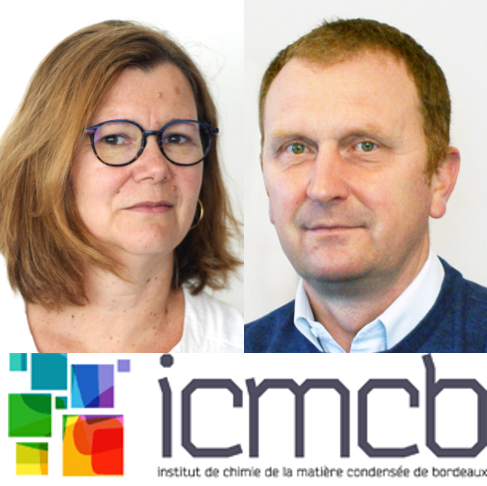A project at the interface between data science and materials science, why?
Carol Lecotter Our laboratory specializes in solid-state chemistry and materials science, especially inorganic ones, from their production processes to the evaluation of their properties, taking into account life cycle management. In the current context of the energy transition and the need to decarbonize industries, it has become urgent to accelerate the discovery of new materials that are more efficient and/or dispense with critical elements, but are also less energy consuming and more sustainable. Processes . .
In basic research, this acceleration requires the use of new methods, in particular the shift to computational screening tools that make it possible to analyze in a short time a very large number of data, which can be combinations of materials or even synthesis process parameters, to identify the best candidates and test them on Laboratory scope. From batteries to electrochemical materials, including (micro)flow manufacturing processes, many areas of materials chemistry can be affected by the Malcom IRP.
What was the genesis of this project at ICMCB?
Cyril Emonaire This project already includes many of the laboratory’s research topics. I would go further: it embodies a real strategy for fetchingICMCB In the era of data science. With strong experimental experience, we still have very little data science skills. On the contrary, our Belgian partner, Professor Gian Marco Renenes from the Institute of Condensed Matter and Nanoscience at the Université Catholique de Louvain (UCL), leads a team of designers who apply high-throughput theoretical simulations and machine learning in the study and design of innovative functional materials. Thanks to the huge amounts of data generated by theoretical calculations, they have become experts in data science, from securing it to interpreting it. We need these skills to accelerate the discovery of new materials and processes, and they need our knowledge of synthesis and characterization to validate their predictions. Our clear complementarity quickly inspired a targeted collaboration in AI and materials science, which seemed to us the most strategic way to combine our expertise and educate our ICMCB colleagues in data science and “machine learning.” The IRP was the ideal vehicle to create this synergy with the exchanges that also started in 2021 with several residencies of Gian Marco Renenese as Visiting Professor at ICMCB. The dynamism of this cooperation and the quality of the projects initiated have demonstrated interest in sustaining and strengthening our cooperation through the independent review process.
Some examples of such projects that could lead to new materials or processes under Malcolm?
Carol Lecotter First study Use machine learning to develop smart glass by deposition of thin ferroelectric layers* Memory effect. By combining experiments and data science, mapping deposition conditions enabled the desired memory effect of thin tungsten oxide layers to be determined.
Another project uses machine learning to analyze very large databases, such as the Cambridge Structural Database, a global repository of crystal structures of small organic molecules and organometalles. The goal here will be to establish new structure-property relationships in the field of molecular electronics. This project follows the work of ICMCB’s ‘Molecules and Transformable Materials’ group which has already developed an interactive and visual software (OctaDist) to determine structural deformation in octahedral coordination complexes. This program had a theme Publishing Most cited newspaper of 2021 Dalton coefficients.
After Malcolm, what do you hope for at ICMCB?
Cyril Emonaire : In basic research, it’s like everywhere: when the planets line up, things move faster… and for ICMCB, that’s the case now. The Malcom IRP began last January, just months after the official launch of the Exploratory Priority Research (PEPR) program and equipment. Crown Dedicated to accelerating the discovery of innovative materials. Thanks to the IRP, we have become literate in data science and artificial intelligence, and thanks to DIADEM, new platforms for synthesis, characterization, theoretical calculations and data analyzes have become possible throughout France. We are also developing two such platforms at ICMCB, one for high-throughput material synthesis and the other for high-throughput material characterization by X-ray diffraction. These two platforms will generate a huge amount of data that will be necessary to secure and enhance thanks to artificial intelligence, and with Malcolm, we will be ready.
Carol Lecotter : We have been thinking about the problem of data management and security at ICMCB for some time, not only for research data but also for HR and finance services. Thanks to Malcolm, we will one day learn how to secure and exploit all aspects of data science, from electronic lab notebooks to high-speed abstracts and research contracts. Malcom is therefore a valuable tool that allows you to successfully implement a laboratory project. It is also a stepping stone towards other European and international projects, but that is for the future.
* Photoelectricity is the ability of some materials to change color reversibly under the influence of an electrical impulse

“Hardcore beer fanatic. Falls down a lot. Professional coffee fan. Music ninja.”







More Stories
Is updating your electronic devices good or bad? Tips to avoid risks
Boeing's Starliner spacecraft prepares for liftoff with its first astronauts
How to edit only part of an image